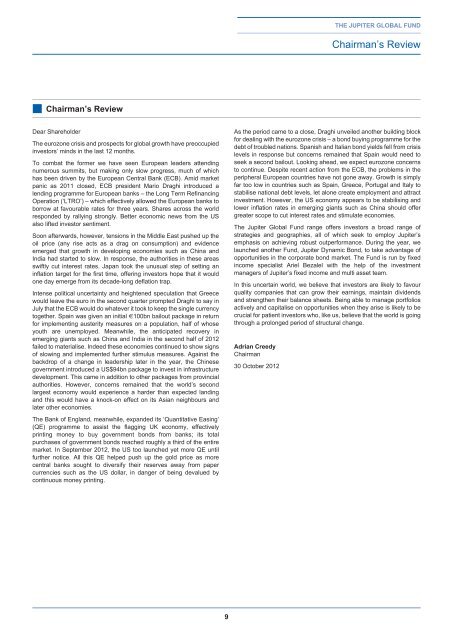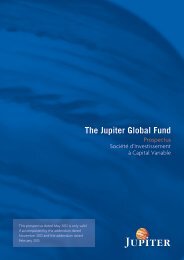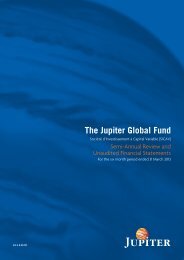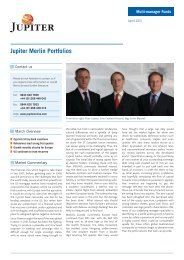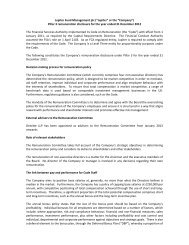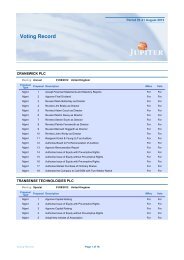The Jupiter Global Fund - Jupiter Asset Management
The Jupiter Global Fund - Jupiter Asset Management
The Jupiter Global Fund - Jupiter Asset Management
You also want an ePaper? Increase the reach of your titles
YUMPU automatically turns print PDFs into web optimized ePapers that Google loves.
the jupiter global fund<br />
Chairman’s Review<br />
■■Chairman’s Review<br />
Dear Shareholder<br />
<strong>The</strong> eurozone crisis and prospects for global growth have preoccupied<br />
investors’ minds in the last 12 months.<br />
To combat the former we have seen European leaders attending<br />
numerous summits, but making only slow progress, much of which<br />
has been driven by the European Central Bank (ECB). Amid market<br />
panic as 2011 closed, ECB president Mario Draghi introduced a<br />
lending programme for European banks – the Long Term Refinancing<br />
Operation (‘LTRO’) – which effectively allowed the European banks to<br />
borrow at favourable rates for three years. Shares across the world<br />
responded by rallying strongly. Better economic news from the US<br />
also lifted investor sentiment.<br />
Soon afterwards, however, tensions in the Middle East pushed up the<br />
oil price (any rise acts as a drag on consumption) and evidence<br />
emerged that growth in developing economies such as China and<br />
India had started to slow. In response, the authorities in these areas<br />
swiftly cut interest rates. Japan took the unusual step of setting an<br />
inflation target for the first time, offering investors hope that it would<br />
one day emerge from its decade-long deflation trap.<br />
Intense political uncertainty and heightened speculation that Greece<br />
would leave the euro in the second quarter prompted Draghi to say in<br />
July that the ECB would do whatever it took to keep the single currency<br />
together. Spain was given an initial €100bn bailout package in return<br />
for implementing austerity measures on a population, half of whose<br />
youth are unemployed. Meanwhile, the anticipated recovery in<br />
emerging giants such as China and India in the second half of 2012<br />
failed to materialise. Indeed these economies continued to show signs<br />
of slowing and implemented further stimulus measures. Against the<br />
backdrop of a change in leadership later in the year, the Chinese<br />
government introduced a US$94bn package to invest in infrastructure<br />
development. This came in addition to other packages from provincial<br />
authorities. However, concerns remained that the world’s second<br />
largest economy would experience a harder than expected landing<br />
and this would have a knock-on effect on its Asian neighbours and<br />
later other economies.<br />
<strong>The</strong> Bank of England, meanwhile, expanded its ‘Quantitative Easing’<br />
(QE) programme to assist the flagging UK economy, effectively<br />
printing money to buy government bonds from banks; its total<br />
purchases of government bonds reached roughly a third of the entire<br />
market. In September 2012, the US too launched yet more QE until<br />
further notice. All this QE helped push up the gold price as more<br />
central banks sought to diversify their reserves away from paper<br />
currencies such as the US dollar, in danger of being devalued by<br />
continuous money printing.<br />
As the period came to a close, Draghi unveiled another building block<br />
for dealing with the eurozone crisis – a bond buying programme for the<br />
debt of troubled nations. Spanish and Italian bond yields fell from crisis<br />
levels in response but concerns remained that Spain would need to<br />
seek a second bailout. Looking ahead, we expect eurozone concerns<br />
to continue. Despite recent action from the ECB, the problems in the<br />
peripheral European countries have not gone away. Growth is simply<br />
far too low in countries such as Spain, Greece, Portugal and Italy to<br />
stabilise national debt levels, let alone create employment and attract<br />
investment. However, the US economy appears to be stabilising and<br />
lower inflation rates in emerging giants such as China should offer<br />
greater scope to cut interest rates and stimulate economies.<br />
<strong>The</strong> <strong>Jupiter</strong> <strong>Global</strong> <strong>Fund</strong> range offers investors a broad range of<br />
strategies and geographies, all of which seek to employ <strong>Jupiter</strong>’s<br />
emphasis on achieving robust outperformance. During the year, we<br />
launched another <strong>Fund</strong>, <strong>Jupiter</strong> Dynamic Bond, to take advantage of<br />
opportunities in the corporate bond market. <strong>The</strong> <strong>Fund</strong> is run by fixed<br />
income specialist Ariel Bezalel with the help of the investment<br />
managers of <strong>Jupiter</strong>’s fixed income and multi asset team.<br />
In this uncertain world, we believe that investors are likely to favour<br />
quality companies that can grow their earnings, maintain dividends<br />
and strengthen their balance sheets. Being able to manage portfolios<br />
actively and capitalise on opportunities when they arise is likely to be<br />
crucial for patient investors who, like us, believe that the world is going<br />
through a prolonged period of structural change.<br />
Adrian Creedy<br />
Chairman<br />
30 October 2012<br />
9


